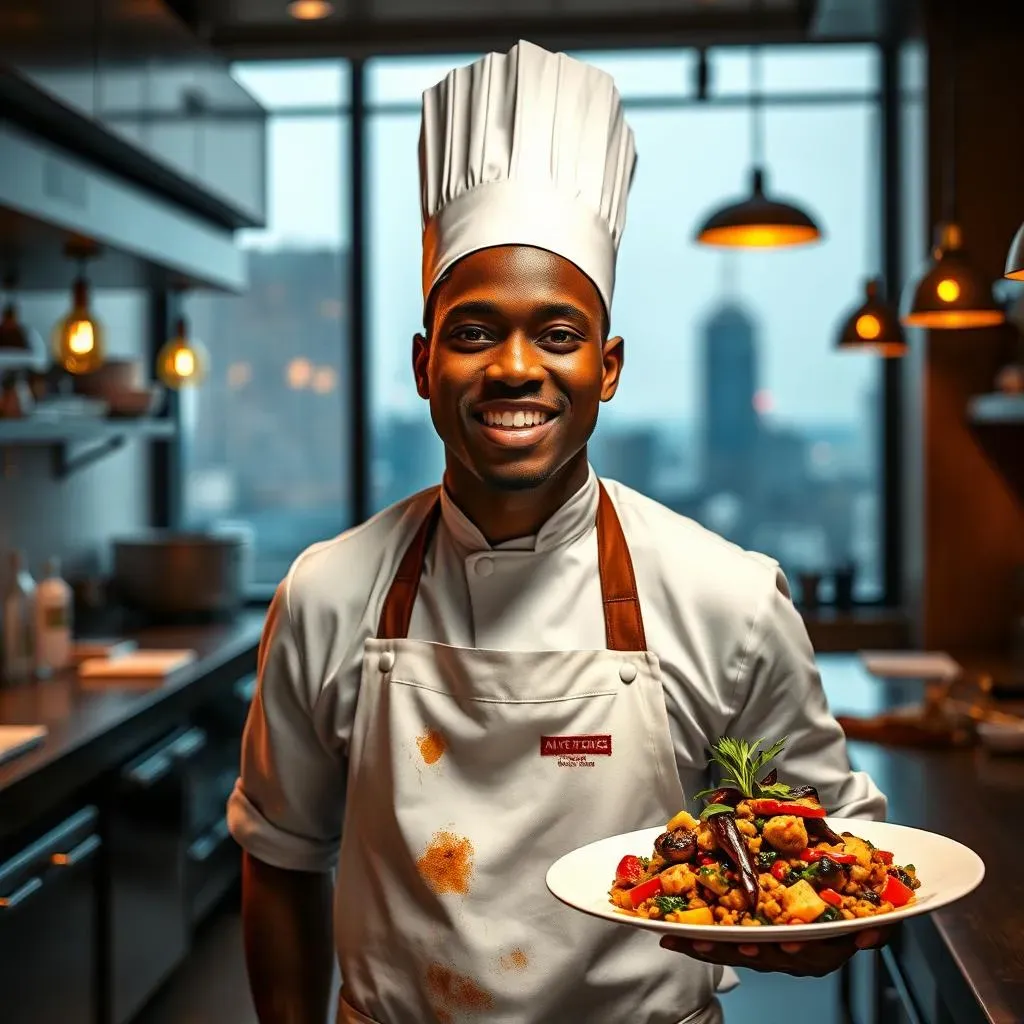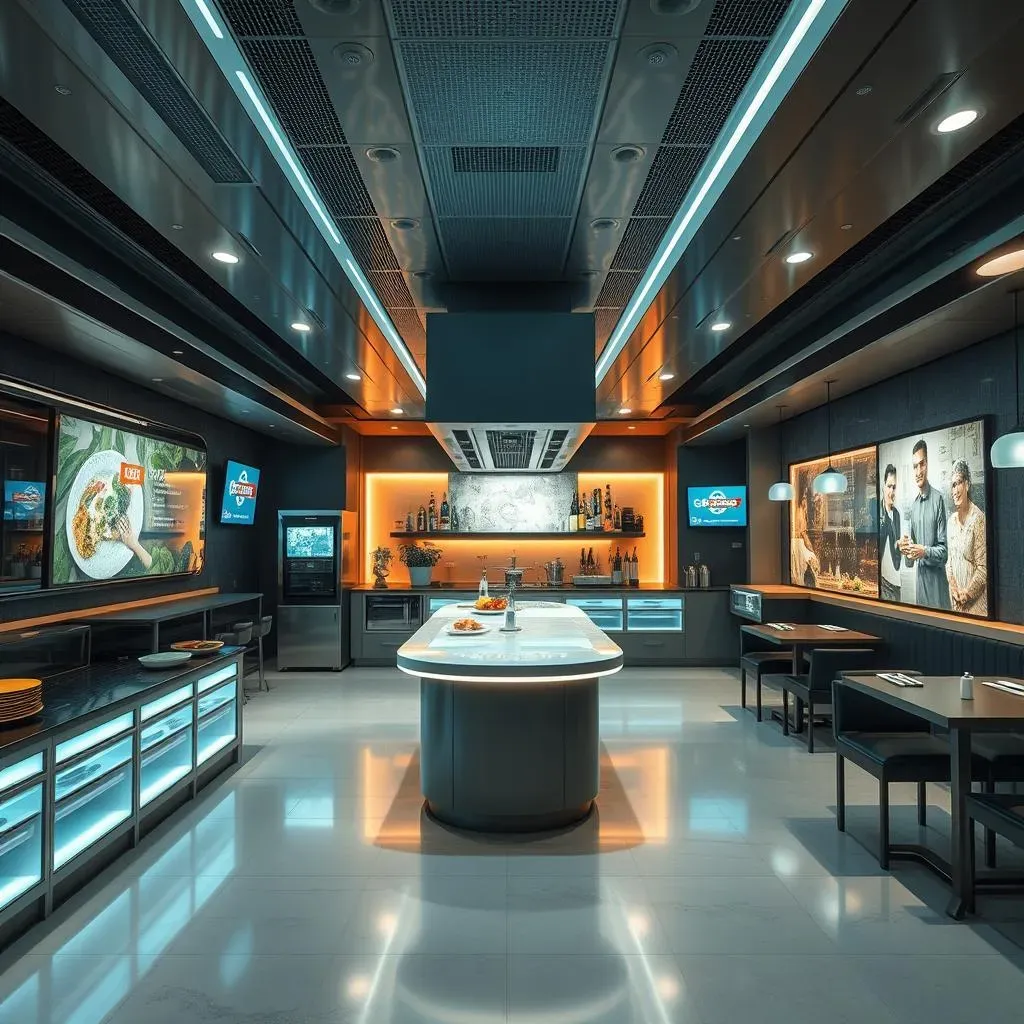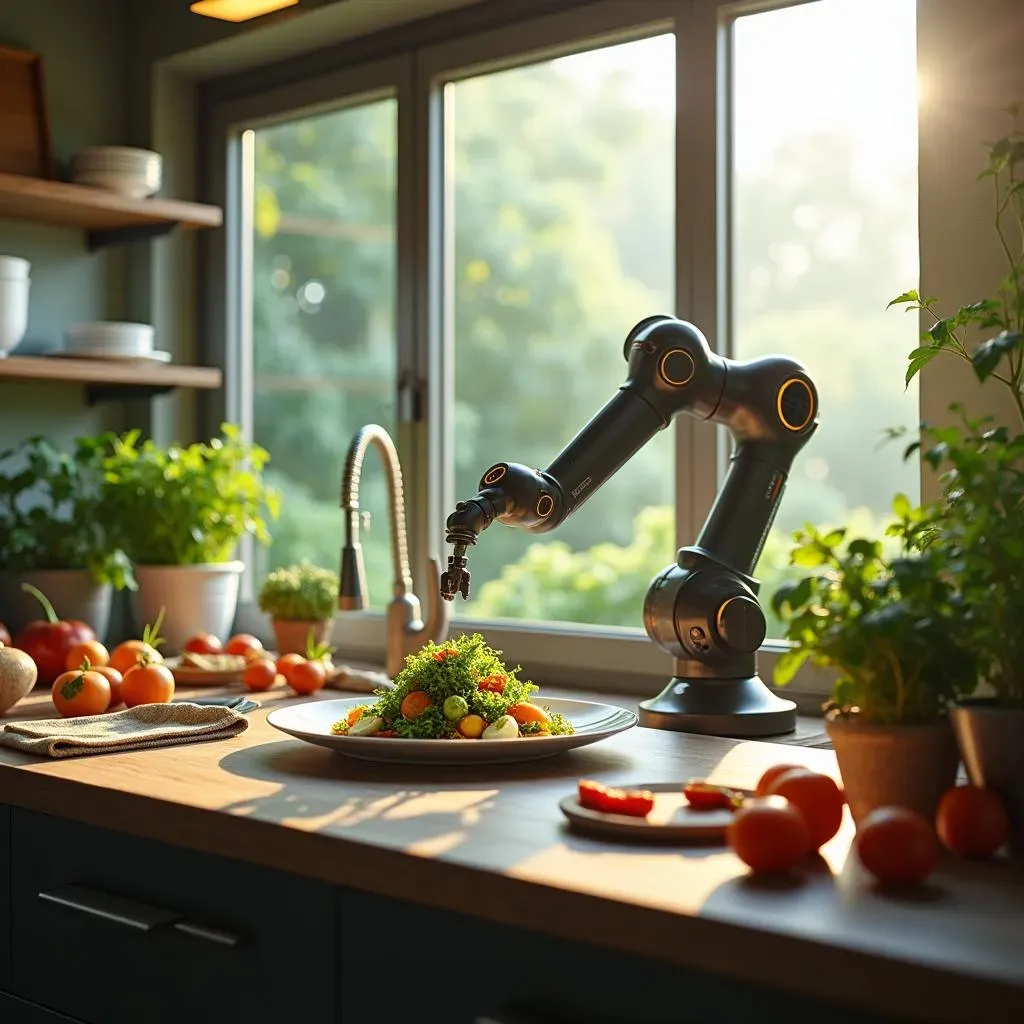Table of Contents
Get ready to tantalize your taste buds and explore the vibrant world of American cuisine! This article dives into the exciting landscape of Rising US chefs and restaurateurs, showcasing the incredible talent shaping the future of food in the United States. We'll introduce you to the next generation of culinary stars, highlighting their innovative dishes, unique restaurant concepts, and the inspiring stories behind their success. From groundbreaking business models to exciting culinary trends, we'll uncover the forces driving change in the industry. Prepare to be inspired by the creativity, passion, and dedication of these remarkable individuals as we explore the dynamic evolution of the American dining experience. Whether you're a seasoned foodie or simply curious about the latest culinary trends, this journey through the world of Rising US chefs and restaurateurs promises a delicious adventure. So, let's embark on this culinary exploration and discover the chefs and restaurateurs who are redefining the American palate!
The Next Generation of Culinary Talent: Meet the Rising US Chefs

The Next Generation of Culinary Talent: Meet the Rising US Chefs
Rising Stars Across the US
Hey, so you're diving into the world of rising US chefs? That's awesome! It's a seriously exciting field right now. There's so much creativity and innovation happening, it's mind-blowing. You'll find chefs pushing boundaries with unique flavor combinations, sourcing hyper-local ingredients, and creating truly unforgettable dining experiences. Think of someone like Chef Kwame Onwuachi, who's not only a phenomenal cook but also a fantastic storyteller. He's blending his Nigerian heritage with modern American techniques, which is just incredible to witness. And it's not just about the food; many of these rising stars are also focused on sustainability, community engagement, and creating inclusive spaces within their restaurants. It's a whole new level of thoughtfulness in the industry. For example, you might want to check out some of the emerging US celebrities of diverse backgrounds who are making a real impact. They often showcase their cultural heritage through their cooking.
One thing that really strikes me is how many of these chefs are opening restaurants in unexpected locations. They're not just sticking to the big cities; they're revitalizing smaller towns and communities with their unique culinary visions. This is bringing exciting new dining options to places that might have been overlooked before. And it's not just about the food; many of these chefs are also focused on sustainability and creating inclusive spaces within their restaurants. This shift toward community-focused restaurants is something really special. It's refreshing to see. It's a testament to the changing dynamics of the culinary world. If you're interested in seeing how other up-and-coming stars are making their mark, you should check out some of the rising stars from independent films — their stories are just as captivating.
Chef | Restaurant | Unique Style |
|---|---|---|
Chef Kwame Onwuachi | Kith/Kin (Washington, D.C.) | Afro-Caribbean fusion |
(Add another chef here) | (Add restaurant here) | (Add unique style here) |
Beyond the Big Cities
One thing that's really interesting is the rise of chefs who are opening restaurants outside of the usual culinary hubs like New York and Los Angeles. These chefs are bringing their unique culinary visions to smaller towns and cities, which is really exciting. They're not just opening restaurants; they're revitalizing entire communities. It's a fascinating trend to watch unfold. This is a really powerful way to show how the culinary world is expanding and evolving beyond the traditional centers of power. For example, you might want to check out some of the emerging US celebrities in visual arts — they're also making a big impact in their communities.
I think this is a really positive trend in the culinary world. It's showing that great food and innovative culinary experiences are not limited to big cities. It's also a great way to support local economies and bring new opportunities to smaller communities. It's all about creating a more diverse and inclusive culinary landscape. This is a testament to the talent and passion of these chefs, who are willing to take risks and invest in areas that might not typically be considered culinary destinations. It's a really exciting development in the industry. If you're interested in learning more about the stories behind these chefs' successes, you might want to check out interviews with emerging US celebrities.
- Increased access to diverse culinary experiences
- Economic revitalization of smaller communities
- Support for local farmers and producers
Beyond the Plate: Innovative Restaurant Concepts and Business Models

Beyond the Plate: Innovative Restaurant Concepts and Business Models
Ghost Kitchens and Virtual Brands
Okay, so you're looking at innovative restaurant models? Let's talk ghost kitchens! These are basically delivery-only restaurants, with no physical storefront. It's a huge trend right now, letting chefs focus solely on food prep and delivery. Think of it as a super-efficient way to reach a wider customer base without the overhead of a traditional restaurant. It's all about maximizing efficiency and profitability. Plus, it opens doors for chefs who might not have the capital to open a full-blown restaurant. It's a game-changer, really. It's amazing how creative some of these up-and-coming chefs are getting with their business models. If you want to see how other entrepreneurs are disrupting their industries, check out some emerging US influencers on social media; they're using similar strategies.
And then there are virtual brands – these are essentially menu concepts that exist only for delivery or takeout, often operated out of existing kitchens. It's like having multiple restaurants under one roof, maximizing kitchen space and resources. It's a smart way to diversify offerings and appeal to a wider range of customers. It’s all about optimizing resources and reaching a wider audience. This flexibility is a key reason for their success. For a deeper dive into how other businesses are innovating, you could look at the up-and-coming American fashion designers – they're constantly reinventing their approach to business.
Model | Description | Advantages |
|---|---|---|
Ghost Kitchen | Delivery-only restaurant | Low overhead, wide reach |
Virtual Brand | Delivery/takeout concept | Diversified menu, efficient use of space |
Subscription Services and Meal Kits
Another big area of innovation is subscription services and meal kits. Chefs are creating curated meal experiences delivered right to your door. It's like having a personal chef, but without the hefty price tag. These services offer convenience and introduce people to new cuisines and flavors. It’s all about convenience and access to unique culinary experiences. This is a clever way to reach customers who value ease and variety. Many of these services also focus on sustainable practices and locally sourced ingredients. If you are interested in the impact of technology on other industries, you could explore the rising US celebrities in podcasting – they are using technology to reach a wide audience.
Meal kits are similar, but they provide all the ingredients and instructions for customers to cook at home. It's a fun, educational way to explore new recipes and expand culinary skills. It's perfect for people who want to cook but might not have the time or confidence to create complex dishes. This model brings high-quality ingredients and recipes directly to consumers. It's a great way to introduce people to different cuisines and cooking techniques. This model is expanding rapidly, offering a diverse range of options. For a different perspective on creative business models, you could look at emerging US authors making waves — their approaches are as unique as their stories.
- Convenience and accessibility
- Exposure to new cuisines and recipes
- Focus on sustainability and local sourcing
Community-Focused and Experiential Dining
Beyond the business models, there's a growing emphasis on community and experience. Many rising chefs are creating restaurants that are more than just places to eat; they're community hubs, fostering connection and a shared love of food. It's about building relationships with customers and creating a sense of belonging. It's about building a community around food. This is a really important aspect of the modern dining scene. It’s a powerful way to build loyalty and create a memorable experience for customers. If you're looking for other examples of community-focused businesses, you could look at the emerging US celebrities in theatre – they work hard to build a connection with their audience.
Experiential dining is another significant trend. Chefs are incorporating unique elements into their restaurants to create memorable experiences for guests. This could involve anything from interactive cooking classes to themed nights to unique dining settings. It’s about making a meal more than just a meal. It’s a way to enhance the dining experience and create lasting memories. It's a way to add a layer of excitement and engagement that you don't often find in traditional restaurants. For another perspective on creating memorable experiences, you might want to explore the work of emerging US celebrities to watch in 2024; they often incorporate unique elements into their projects.
The Future of Food: Trends and Predictions from America's Top Culinary Minds

The Future of Food: Trends and Predictions from America's Top Culinary Minds
Hyperlocal and Sustainable Sourcing
So, you're diving into the future of food? That's fantastic! One of the biggest trends I'm seeing is a massive focus on hyperlocal and sustainable sourcing. Chefs are increasingly working directly with local farmers and producers, creating menus that reflect the seasonality and unique characteristics of their region. This isn't just a trendy buzzword; it's a fundamental shift in how chefs are thinking about their ingredients and their impact on the environment. It’s about building relationships with the people who grow their food and reducing their carbon footprint. It’s a win-win for both the chefs and the environment.
Think about it – a chef using tomatoes picked that morning from a nearby farm, bursting with fresh flavor. That's a completely different experience than using mass-produced tomatoes shipped from across the country. This approach creates a more authentic and flavorful culinary experience, and it also supports local economies and sustainable agricultural practices. It's a really positive trend, and I think it's only going to grow in the coming years. If you're interested in seeing how other creators are embracing sustainability, check out some breakthrough US artists in 2023 – many are incorporating sustainable practices into their work.
Ingredient | Source | Impact |
|---|---|---|
Tomatoes | Local farm | Reduced carbon footprint, enhanced flavor |
Seafood | Sustainable fisheries | Protection of marine ecosystems |
Technology's Role in the Kitchen
Another huge factor is technology. We're seeing incredible advancements in kitchen technology, from robotic systems to precision fermentation. These technologies are transforming how chefs prepare food, increasing efficiency, reducing waste, and opening up new culinary possibilities. It's a fascinating area to watch, and it's going to have a profound impact on the future of cooking. It's all about enhancing the culinary experience while also improving efficiency and sustainability.
Precision fermentation, for example, allows chefs to create meat alternatives and other ingredients with a lower environmental impact. Robotic systems can handle repetitive tasks, freeing up chefs to focus on creativity and innovation. It's a real game-changer. It's incredible to think about the possibilities that technology is opening up for chefs. For another look at how technology is changing industries, check out the rising American musicians to watch – they’re using tech to reach a global audience.
- Increased efficiency and productivity
- Reduced food waste
- New culinary possibilities
The Rise of Plant-Based Cuisine
And finally, let's talk about plant-based cuisine. It's no longer a niche trend; it's a mainstream movement, with more and more chefs incorporating plant-based dishes into their menus. This isn't just about vegetarian or vegan options; it's about creating delicious and innovative plant-based dishes that appeal to everyone. It's about showcasing the versatility and deliciousness of plant-based ingredients. It's a reflection of changing consumer preferences and a growing awareness of the environmental and ethical implications of our food choices.
Chefs are getting incredibly creative with plant-based ingredients, developing innovative techniques and flavor combinations that rival traditional meat-based dishes. It’s about creating truly delicious and satisfying meals without relying on animal products. It's a huge opportunity for chefs to demonstrate their creativity and contribute to a more sustainable food system. For a different perspective on creative expression, you might want to check out some emerging US celebrities in visual arts — their work is just as innovative.